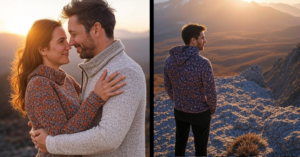The Small Part of Who We Are

“I think everybody should get rich and famous and do everything they ever dreamed of so they can see that it’s not the answer.”
Jim Carrey, actor and comedian
What does it mean for something to be mine?
I suppose it means that I possess or have ownership of it. This is my watch. Over there, that’s my car.
But in reality, we all know it’s just temporary. All of these things are simply objects that will someday be gone or even belong to someone else.
It feels natural to worry about the things we identify as “mine.” We get caught up in our day-to-day welfare, security, status—all the things that make us feel important and safe. Our minds constantly spin with thoughts of what we need to do to protect or advance these physical pieces of our lives.
But deep down, we know that the constant attention to “I” or what’s “mine” isn’t who we truly are. What if, in focusing so much on these concerns, we’re missing something greater?
In reality, these aspects of our lives—our achievements, appearances, or possessions—are fleeting, like “dust in the wind,” as the classic song by the rock group Kansas reminds us. The Bible says that we came from dust, and to dust we will return. And while this truth might be confronting or uncomfortable, it reveals something profound—that we’re infinitely more than the things we accumulate or worry about.
The Bag of Dust
As we age, we gradually begin to see the limitations of our physical bodies. Injuries don’t heal as quickly. Energy wanes. And we notice the “bag of dust”—our body—starting to wear out.
It’s easy to become preoccupied with this process of aging, to fixate on the deterioration of what once felt strong. Yet, this realization can also be a gateway to discovering a deeper truth about ourselves.
Our bodies are like containers, and though they serve an essential role in allowing us to experience the wonder of this world, they’re only temporary. Over time, the bag of dust begins to tear and fray, a clear sign that our physical existence has an expiration date.
But while our bodies may falter, there is something within us that does not age, break, or weaken. This inner part is what many believe to be the “Breath of God,” the divine, infinite spark that animates us. Unlike the bag of dust, this breath doesn’t fade. It remains vibrant and alive, connecting us to love, kindness, generosity, and other qualities that define our true selves.
More Than the Bag
Think about your heart for a moment. It pumps blood, keeping you physically alive. But what keeps your love, kindness, and generosity alive? Where do these qualities come from? If your heart were to stop, your body would cease to function, but love and compassion don’t reside in any one organ. They are expressions of something deeper—from the divine breath within us.
What if, instead of focusing so much on our physical bodies and material concerns, we shifted our attention to cultivating the breath within us? We could begin to realize that our true essence isn’t in the things we achieve or own, but in the love, kindness, and generosity we share with others. Perhaps this breath isn’t constrained by the bag of dust—it only appears to be when we give too much attention to the small, surface-level aspects of life.
This shift in focus allows us to see that much of what we worry about—the “mine”—is temporary and ultimately unimportant. All the things we own, the status we hold, and even our physical bodies will all fade away in time. Here’s what endures: the deeper essence of a soul that connects us to others and to something greater than ourselves.
Moving Beyond “Mine”
When we cling tightly to what is mine, we limit ourselves to a small version of who we are. We become preoccupied with protecting things that are temporary and miss out on the eternal truth within us. By letting go of this narrow view and expanding our awareness to include the deeper, divine essence within, we open ourselves to a life of greater meaning and connection.
This doesn’t mean we should neglect our bodies or possessions, but we should recognize that they are not the ultimate truth of who we are. They are tools, not the essence. The real value lies in how we use them to express the love, kindness, and generosity that flow from the breath of life within us.
Three Things to Do:
- Shift Your Focus from “Mine” to “Ours”
Instead of focusing on your personal welfare, expand your thinking in terms of how you can contribute to the welfare of others. Acts of kindness and generosity can reveal the deeper part of who you are. - Cultivate the Inner Breath
Spend time each day in stillness or meditation, allowing yourself to connect with the divine breath inside you. Focus less on your physical body and possessions, and more on your inner qualities such as love and compassion. - Let Go of Material Attachments
Practice detaching from material concerns by recognizing that they are temporary, like dust. Focus instead on relationships and moments that bring true fulfillment.
Bringing these practices into your daily life can help you connect with the deeper essence of who you are, beyond the worries and distractions of daily life—knowing that your true self isn’t bound by the bag of dust, but is something eternal, beautiful, and limitless.
-Jack




